Why is Orbán courting Erdoğan?

További In English cikkek
Shortly before Turkish President Recep Tayyip Erdoğan's visit, the Hungarian government made a grand gesture towards Turkey by proclaiming their support for the north-Syrian intervention, calling it a "Hungarian national interest."
Another thing that could give Erdoğan a reason to smile is that Hungary blocked the EU's joint warning to Turkey about the intervention that Erdo
ğan characterised as an anti-terrorist operation, but which, in part, is aimed at changing the ethnic composition of the area inhabited by Kurds, and in the end, the declaration was only published after the operation began and just as a statement by the EU's High Representative for Foreign Affairs. (Despite Erdoğan's gratitude though, Orbán did not veto a similar declaration later in the European Council, so the European Union did officially condemn the operation, and even Fidesz's MEPs voted for the resolution calling for sanctions against Turkey.)
Although the timing is merely a coincidence: The Turkish intervention was made possible by the unexpected decision made by US President Donald Trump to remove of US forces from the Kurd-controlled areas, therefore EU statements could only have been made afterwards, but Erdoğan's visit was organised approximately six months ago.
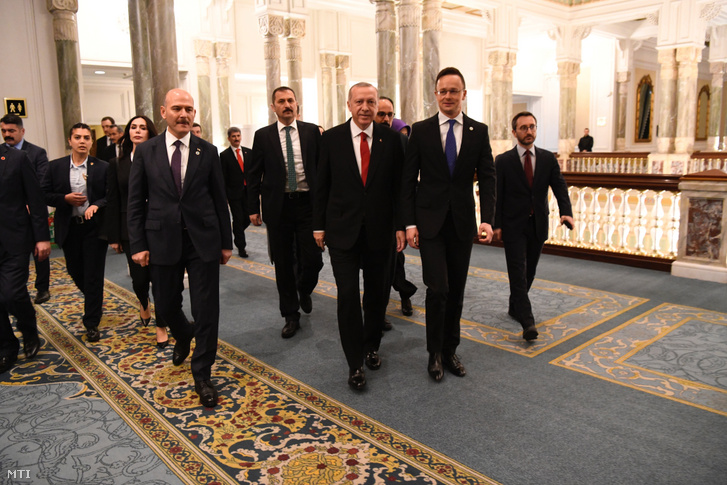
But there is no coincidence in Turkish President Erdoğan coming to Budapest as if it were his second home since Orbán's government had been making efforts towards a friendly relationship with him for quite some time.
- The Hungarian PM welcomed Erdoğan during his first visit in 2013 by saying he is "one of the outstanding political leaders of this decade,"
- In 2016, he lauded the constitutional amendments in Turkey that helped Erdoğan to centralise power,
- It was a small, but telling gesture that the exhibition last year in the renovated tomb of Gül Baba portrayed the 150 years of Ottoman occupation more like friendly cooperation than an annexation that broke the country in three,
- Last year, Hungary became an observer in the Turkic Council which even opened a representation in Hungary this September. In 2018, Orbán spoke about the Hungarian language belonging to the Turkic linguistic family, and by this year, he upped the ante to genetic relations as well, claiming that there is also Kipchak blood flowing in the veins of Hungarians.
The numbers are not there
But in actual fact, the endeavour to increase trade between Hungary and the region of Turkey, Azerbaijan, and other former Turkic member states of the Soviet Union did not succeed all that much: trade volume with the entire region where approximately 140 million people live still remains around four billion dollars, and around 75% of that is with Turkey, as economic news site G7 summarised. That does signal an increase though, albeit nominally, a small one - it still remains below 2% of the trade volume between Hungary and other EU member states. In 2017, Erdogan and Orbán were in agreement that the large-scale plans of increasing trade fell through and they decided to set a yearly trade goal of $6 billion, however, that goal is still $3 billion away, as 444.hu wrote.
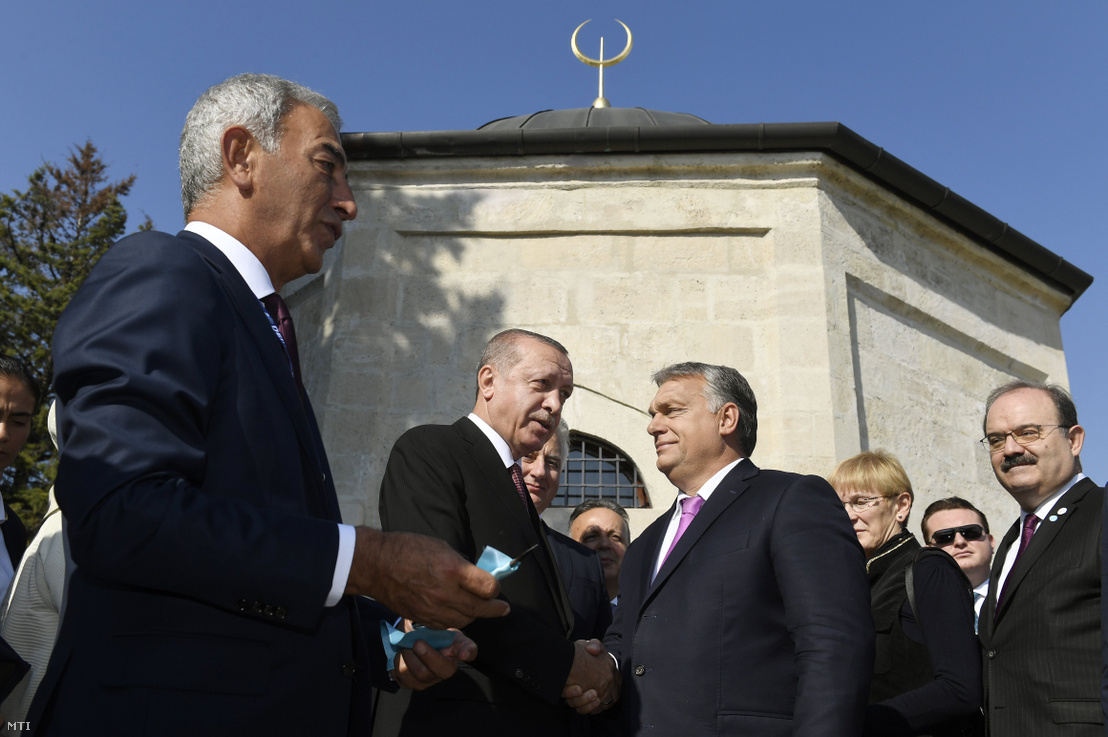
Although a significant jump is on the horizon: in September, it became apparent that the Hungarian army is buying armoured vehicles from Turkey. Hungary will pay around 3.5 billion Forints (~$12 million) for the 6 or 7 vehicles, but the country is not buying them directly from Turkey, but through an intermediary company co-owned by a certain Suat Gökhan Karakus, a partner of Turkish businessman Adnan Polat, who is rather close to Prime Minister Viktor Orbán, and László Szíjj who is a government favourite. As HVG noted, his construction company Duna Aszfalt raked in over 1000 billion Forints (~€3 billion) from state contracts, but he was also the businessman who eventually took over Közgép, the flagship of Lajos Simicska's corporate empire, after the former financial mastermind behind Fidesz fell out with Prime Minister Viktor Orbán.
But hopes of systematically increasing trade volume seem to be in vain: the Hungarian small and medium-sized enterprises are not competitive or big enough to be a substantial presence in Turkey which may be at a similar level of development as Hungary, but it is eight times as large. The other factor hindering these efforts is that the Turkish economy has been suffering a drawn-out crisis for some time and the low point is still ahead.
Trade with other member states of the Turkic Council is even smaller: Kazahstan's 500 million Euro oil export towards Hungary may put them on the map, but trade volumes with Kirgisistan and Uzbekistan are both around 10 million Euros, and Azerbaijan remains under 50 million as well.
Mutual interests
Azerbaijan still plays a special role: MOL just bought a 10% share in one of the largest oil fields in the world. The Hungarian oil company purchased the $1.5 billion USD share from Chevron, acquiring their 9.57% of the Azeri-Chirag-Gunashli (ACG) oil field and 8.9% of the Baku-Tbilisi-Ceyhan pipeline as well, making them the third-largest partner in ACG.
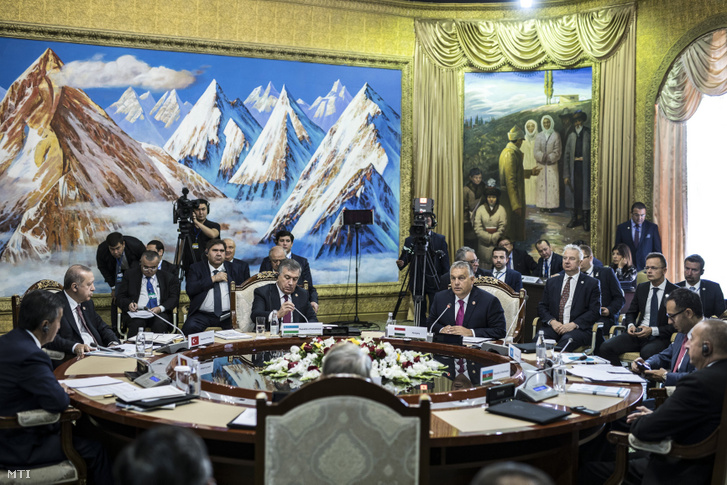
Earlier, Hungary tried to get in favour with Azerbaijan indirectly, note the extradition of Ramil Safarov, the 'axe murderer' who killed an Armenian officer in Hungary - he was given over to Baku in 2012 where he was celebrated as a hero after receiving a presidential pardon instead of the prison cell he was supposed to get by law. But even with the close ties of Hungary and Azerbaijan, a friendly relationship between Ankara and Budapest only improves the Hungarian positions in Baku. Though MOL's deal was officially made between two companies, nobody disputes that a good political atmosphere could help.
Moreso, the Hungarian government acknowledging the legitimacy of the Turkish intervention in Syria further elevated the country in the eyes of Turkish leaders, Egeres Zoltán, a fellow of the Defense Strategy Institute (Védelmi Stratégiai Intézet) told Index. He thinks that the effects could go further than that, as Turkish opposition parties are also supportive of the military operation, with the obvious exception of Kurdish DHP.
Egeres said that the rearrangement of the energy market is essential in understanding Turkish-Hungarian relations. The significance of Turkey as an oil and natural gas transit country towards Europe is increasing, and not only with gas and oil coming from Russia, but also from Azerbaijan and Central Asia as well - although China is gaining the upper hand in that region.
After Gazprom's South Stream fell through primarily due to protest from the EU, Russia ended up constructing the TurkStream pipeline through the Black Sea, where natural gas would be transferred towards Austria through the Balkans, touching Hungary as well.
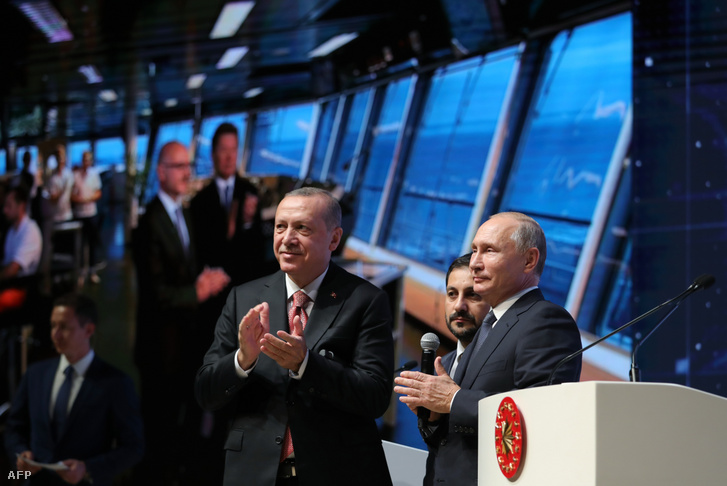
Besides Russian gas, the TANAP pipeline completed this year transfers natural gas from Azerbaijan to Istanbul, where natural gas could be imported to Europe as an alternative to Russian gas. It is Hungary's fundamental interest to participate in the construction of that pipeline if the country wants to gain good bargaining positions on the natural gas market as a buyer.
Baksheesh for the refugees
The cordial relationship even withstood that Erdoğan practically blackmailed the EU when he talked about opening the gates towards the West for the 3.5-4 million Syrian refugees currently residing in Turkey, calling images of the 2015 refugee crisis to mind. The Hungarian government mostly adopted Erdoğan's views, saying that the Syrian military intervention facilitates the return of refugees to Syria, and the Hungarian government does not question Turkish claims of spending around $40 billion on the management of refugees over the course of eight years either, not even coupled with the fact that the largest Turkish refugee camps were closed already.
Egeres says that the sums are difficult to check, but they could indeed be severe, it's enough to remember that 400,000 Syrian children were born in Turkey, and just the medical costs pertaining to that could be substantial, and there are also refugee camps in North-Syria maintained by Turkey. But a million Syrians receive financial support from EU funds, and the EU is covering the construction of schools and hospitals for them too. Ankara's complaint is that the EU is funding specific projects instead of handing money over to Turkey to manage it freely.
Apart from that, Egeres thinks it is unlikely that Erdoğan would unload refugees on Europe. "This trump card is only useful until he plays it," the expert noted, reminding that Erdoğan made several similar statements over the recent years. He added that multiple fences similar to the one on Hungary's southern border were built in the Balkans over the past couple of years, and that also has to be taken into account, as they could deter many from risking the hazardous and expensive journey.
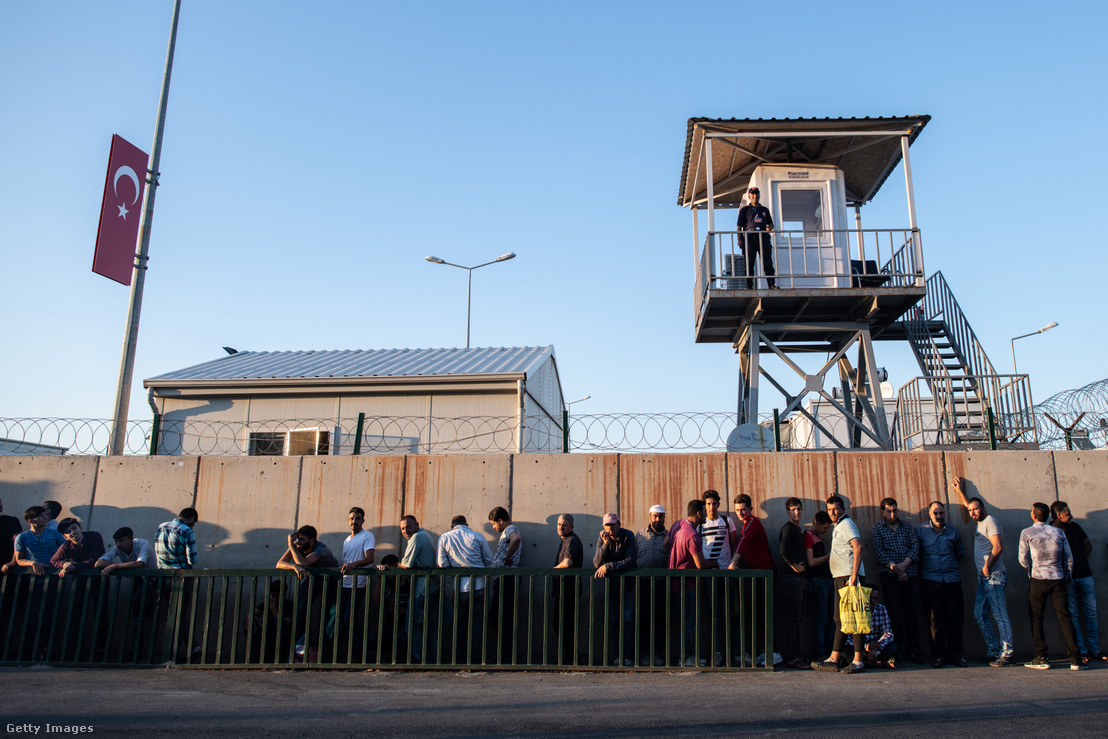
"Peacock Dance"?
But the Hungarian government does not really have many ways to attract Ankara's attention, and they have actually been rather successful at that as it is: as we explained above, the Hungarian government managed to take a stand by the Turkish military intervention in Syria without stopping the EU's condemnation.
The Turkish armoured vehicles are not a significant item in the budget, but still, they will be useful to increase trade volume, even if just for now. The last step of the foreign policy strategy often described as Orbán's "peacock dance" was when Orbán teased at supporting Turkey in the stuck EU ascension negotiation process if the Hungarian EU Commissioner-designate Olivér Várhelyi gets the enlargement portfolio (which he might). But for that, the European Parliament still needs to approve Várhelyi, and that is not so sure, so Orbán could end up making another grand gesture which, ultimately, would have no actual consequences.
Update: Hungarian commissioner-designate Olivér Várhelyi is officially in line for the portfolio of enlargement and relationship with the EU's neighbours.
This article is a translation of the original published in Hungarian by Index, with some context added for clarity.

Support the independent media!
The English section of Index is financed from donations.


